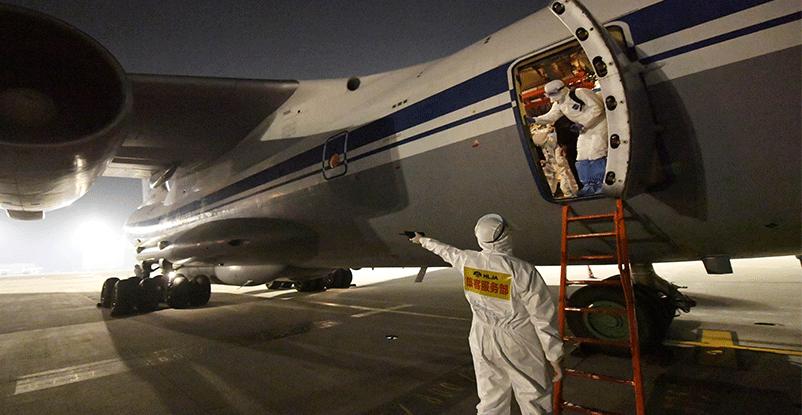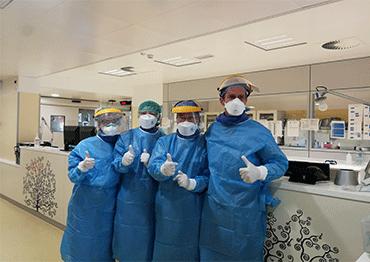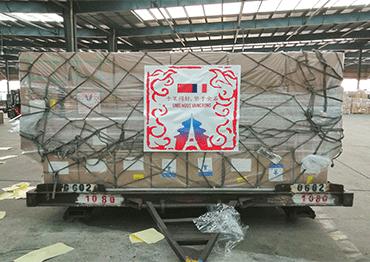Since the first case of Covid-19 caused by the novel coronavirus SARS-CoV-2 was reported in early December 2019, the disease has caused a global pandemic, which has spread to almost every corner of the planet, infecting almost 2 million people and causing over 119,686 deaths worldwide.
As the pandemic is set to stick around for months if not years, while spreading to the less developed parts of the world including Africa and South America, there are concerns that the current outbreak is just the beginning. Stronger global cooperation will be needed to contain and mitigate its health and economic impacts.
On April 7, an international group composed of 205 former presidents and prime ministers, along with current government, health and economic leaders from 74 developed and developing countries released a call to action, with an open letter demanding the creation of a G20 executive task force and an immediate global pledging conference. The plea requested world leaders to commit to a US$8 billion fund to hasten the global effort for vaccines, cures and treatment, US$35 billion to support health systems and buy equipment, as well as US$150 billion for developing countries to fight the virus.
In early March, the G20, composed of 20 of the world’s largest economies which account for 80 percent of global GDP, held an emergency summit over the coronavirus and pledged to do “whatever it takes” to tackle the crisis that threatens all humanity. Unfortunately, with the US appearing to be absent, if not actively disruptive from a global leadership role, engaging in a blame game with China and other international organizations, strong global collaboration on the issue appears to be out of reach.
The same day the open letter was released, US President Donald Trump lashed out at the World Health Organization (WHO), criticizing the agency’s response to the Covid-19 pandemic. One week later, Trump announced that it would halt funding to the WHO. This is a big step on from the proposed 2021 budget the Trump administration made in February when it said it would make more than half voluntary contributions to the WHO to about US$58 million.
Earlier in March, Trump and US Secretary of State Mike Pompeo repeatedly referred to the virus as the “Chinese virus” or “Wuhan virus,” which critics said was intended to divert criticism over Washington’s handling of the crisis.
While triggering a diplomatic brawl with China, the US insistence on describing the health crisis as distinctively Chinese also thwarted the efforts of the UN Security Council and the G7 group to agree on a global response in early March.
As the US now has the highest number of infections and deaths due to Covid-19, it has joined the race to acquire scarce medical suppliers and protective equipment, prompting countries to complain about allegedly unfair practices conducted by the US and fueling tensions between Washington and its allies.
In early April, officials in France and Germany accused the US of using unfair means to intercept medical supplies procured by their own countries in transit to the US. Berlin Interior Minister Andreas Geisel described the US practices as “modern piracy,” accusing Washington of diverting a shipment of masks intended for German police from Thailand. Washington denied the accusations, saying the American buyers were unaware the supplies were earmarked for other countries.
Even so, news of the US flying out half a million diagnostic swabs made in Italy at the same time that a Chinese plane carrying 30 tons of medical supplies arrived in Italy, sent a clear message about the US’s absence from global leadership.
In what seems like an attempt to repair the damage, the Trump administration announced on April 11 that it would provide “a robust assistance package” to Italy. According to the US state department, the package will involve the 30,000 US military personnel stationed in Italy, who will assist the Italian government by providing medical supplies, humanitarian relief and other assistance in the fight against the coronavirus. Pompeo also announced on April 7 that the US will commit an additional US$225 million to bolster the global response to the coronavirus.
But given the Trump administration’s record in cutting foreign aid in the past years, it remains to be seen whether the US is just paying lip service. When China was first struck by the outbreaks, Pompeo made a high-profile announcement on February 7 to offer US$100 million to help China and other countries in their fight against the virus. But on March 20, China said that it had not received a penny from the US government.
In the absence of the US, China appears to be taking a prominent role by actively calling for global cooperation in the fight against the virus. As China has largely brought the outbreak under control in the Chinese mainland and resumed much of its industrial production, China has become a major provider of medical suppliers. At a regular press briefing in Beijing on March 31, Hua Chunying, spokeswoman of the Ministry of Foreign Affairs, said that it has provided medical supplies to 120 countries and four international organizations.
According to China’s Ministry of Commerce, between March 1 and April 6, China provided and exported more than 3.86 billion masks to 50 countries, along with 37.5 million protective gowns, 16,000 ventilators and 2.84 million test kits.
This led many Western analysts to warn against China’s “exploiting” the crisis in its alleged pursuit of global primacy. But from a domestic perspective, China’s approach in promoting global cooperation in the fight against the virus has been rather prudent and cautious.
On the one hand, China has to fend off criticism from the West for its handling of the crisis in the early stages and a long-held suspicion over its strategic intentions behind its calls for global cooperation. On the other hand, the Chinese government faces strong domestic pressure to not overly commit itself, especially when the country faces the threat of a second wave of outbreaks and is challenged by a struggling economy.
Since February, China has sent seven medical teams to five countries, including Italy, Iraq, Iran, Serbia and Cambodia. Chinese officials described the support as reciprocal. When asked about whether China is trying to export the “Chinese model” of governance at a regular press briefing on April 9, Foreign Ministry spokesperson Zhao Lijian said that China’s support is aimed at “reciprocating the goodwill” China had received early on. “We have never exported the Chinese model to anyone, nor asked anyone to copy China’s methods,” Zhao said.
In explaining why China’s medical team sent to Italy is mostly composed of experts from Sichuan Province, Shen Ji, head of the provincial health committee of Sichuan, told domestic media that it is a reciprocal gesture to return the favor provided by Italy, which came to China’s aid after the 8.0 magnitude Wenchuan earthquake, which struck on May 12, 2008 and caused more than 80,000 deaths. Shen said that back then, Italy sent a team of 26 medics and technicians and built a field hospital that treated more than 900 patients.
Saying that China will provide medical supplies to countries in need, spokeswoman Hua Chunying stressed that China’s top priority remains the prevention and control of the epidemic at home. “China’s fight against Covid-19 isn’t over yet, and we are under heavy pressure to guard against imported cases and a rebound in domestic cases,” she said.
For many experts, China has good reason to be cautious. During a seminar held on March 29 in the School of International Studies (SIS) at Peking University on the pandemic’s impact on world politics, the consensus among experts was that as the US shift inpolicy from global leadership to great power politics would lead to increased US hostility towards China in the post-pandemic world.
Lei Shaohua, assistant professor at the School of International Studies of Peking University, said the US-China relationship has been hijacked by the health crisis.
As Trump’s argument that China should take responsibility for its own failure to prevent the outbreak has gained traction in American society, Lei warned the bilateral relationship may enter a dark period in the post-pandemic world. “The more the US suffers during the Covid-19 outbreak, the more difficult the US-China relationship will become,” Lei said.
According to Wang Yong, a professor and director of the American Studies Center at Peking University, by triggering worldwide economic and financial crises, coupled with a steep drop in oil prices, the Covid-19 pandemic has injected some serious additional uncertainties into an already tumultuous world which had already been affected by the Trump administration’s “America First” agenda.
“The strategic and geographic rivalry, as well as competition over ideologies and development model will intensify following the pandemic,” Wang said.
For Chu Xiaobo, a professor at SIS, the global pandemic could have been an opportunity for leaders around the world to realize the importance of global cooperation. On the contrary, Covid-19 has led to a further rise of nationalism and xenophobia, said Shu Xiaobo. Chu warned that Covid-19 could bring major changes to the model and operation of the global governance system.
According to Zhang Haibin, another professor at SIS, the problem of the global governance system lies in its fragmentation. The pandemic has served to reveal the importance of more robust global cooperation in the health sector. For this to happen, the US and China must have a basic cooperation framework, which Zhang said is clearly missing in the current political atmosphere.
“Global cooperation on health issues has long been considered the one with the least political sensitivities,” Zhang said. “If countries can’t cooperate with each other in this area, it is hard to believe that they can effectively cooperate in any other.”
But not everybody is so pessimistic about the prospect of global governance. Wang Dong, an associate professor of social sciences at Peking University, argued that globalization in the past decades has not been led by politicians but by technological development. “The pandemic has actually exposed our reliance on technology, and the setback to globalization brought by the Trump administration will only be temporary.
“In the past decades, the world has gone through a number of global crises that could jeopardize globalization, but globalization accelerated nevertheless,” Wang said. Wang’s view appeared to be echoed by that of Bill Gates, co-founder and former CEO of Microsoft.
In an online interview with TED’s Chris Anderson on March 24, the philanthropist billionaire who runs the Bill & Melinda Gates Foundation and has contributed up to US$100 million to the global response to Covid-19, said that he was so encouraged by cooperation among the science community around the globe that he believed the world would even apply learning from the Covid-19 response to other tough issues like climate change.
In an article published in The Sunday Telegraph on April 12, Gates called for a “global approach” to fighting the disease. “Humanity, after all, isn’t just bound together by common values and social ties. We’re also connected biologically,” Gates wrote. “In this pandemic we are all connected. Our response must be, too.”

 Old Version
Old Version

